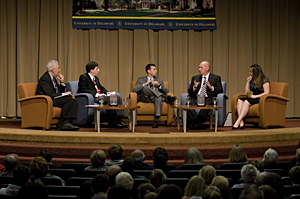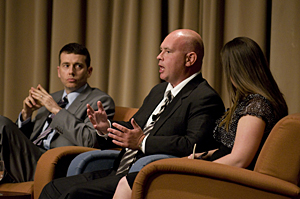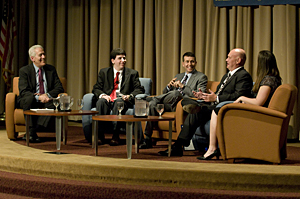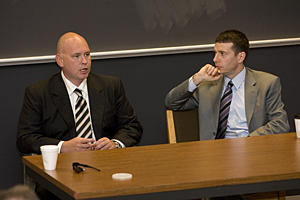
- Rozovsky wins prestigious NSF Early Career Award
- UD students meet alumni, experience 'closing bell' at NYSE
- Newark Police seek assistance in identifying suspects in robbery
- Rivlin says bipartisan budget action, stronger budget rules key to reversing debt
- Stink bugs shouldn't pose problem until late summer
- Gao to honor Placido Domingo in Washington performance
- Adopt-A-Highway project keeps Lewes road clean
- WVUD's Radiothon fundraiser runs April 1-10
- W.D. Snodgrass Symposium to honor Pulitzer winner
- New guide helps cancer patients manage symptoms
- UD in the News, March 25, 2011
- For the Record, March 25, 2011
- Public opinion expert discusses world views of U.S. in Global Agenda series
- Congressional delegation, dean laud Center for Community Research and Service program
- Center for Political Communication sets symposium on politics, entertainment
- Students work to raise funds, awareness of domestic violence
- Equestrian team wins regional championship in Western riding
- Markell, Harker stress importance of agriculture to Delaware's economy
- Carol A. Ammon MBA Case Competition winners announced
- Prof presents blood-clotting studies at Gordon Research Conference
- Sexual Assault Awareness Month events, programs announced
- Stay connected with Sea Grant, CEOE e-newsletter
- A message to UD regarding the tragedy in Japan
- More News >>
- March 31-May 14: REP stages Neil Simon's 'The Good Doctor'
- April 2: Newark plans annual 'wine and dine'
- April 5: Expert perspective on U.S. health care
- April 5: Comedian Ace Guillen to visit Scrounge
- April 6, May 4: School of Nursing sponsors research lecture series
- April 6-May 4: Confucius Institute presents Chinese Film Series on Wednesdays
- April 6: IPCC's Pachauri to discuss sustainable development in DENIN Dialogue Series
- April 7: 'WVUDstock' radiothon concert announced
- April 8: English Language Institute presents 'Arts in Translation'
- April 9: Green and Healthy Living Expo planned at The Bob
- April 9: Center for Political Communication to host Onion editor
- April 10: Alumni Easter Egg-stravaganza planned
- April 11: CDS session to focus on visual assistive technologies
- April 12: T.J. Stiles to speak at UDLA annual dinner
- April 15, 16: Annual UD push lawnmower tune-up scheduled
- April 15, 16: Master Players series presents iMusic 4, China Magpie
- April 15, 16: Delaware Symphony, UD chorus to perform Mahler work
- April 18: Former NFL Coach Bill Cowher featured in UD Speaks
- April 21-24: Sesame Street Live brings Elmo and friends to The Bob
- April 30: Save the date for Ag Day 2011 at UD
- April 30: Symposium to consider 'Frontiers at the Chemistry-Biology Interface'
- April 30-May 1: Relay for Life set at Delaware Field House
- May 4: Delaware Membrane Protein Symposium announced
- May 5: Northwestern University's Leon Keer to deliver Kerr lecture
- May 7: Women's volleyball team to host second annual Spring Fling
- Through May 3: SPPA announces speakers for 10th annual lecture series
- Through May 4: Global Agenda sees U.S. through others' eyes; World Bank president to speak
- Through May 4: 'Research on Race, Ethnicity, Culture' topic of series
- Through May 9: Black American Studies announces lecture series
- Through May 11: 'Challenges in Jewish Culture' lecture series announced
- Through May 11: Area Studies research featured in speaker series
- Through June 5: 'Andy Warhol: Behind the Camera' on view in Old College Gallery
- Through July 15: 'Bodyscapes' on view at Mechanical Hall Gallery
- More What's Happening >>
- UD calendar >>
- Middle States evaluation team on campus April 5
- Phipps named HR Liaison of the Quarter
- Senior wins iPad for participating in assessment study
- April 19: Procurement Services schedules information sessions
- UD Bookstore announces spring break hours
- HealthyU Wellness Program encourages employees to 'Step into Spring'
- April 8-29: Faculty roundtable series considers student engagement
- GRE is changing; learn more at April 15 info session
- April 30: UD Evening with Blue Rocks set for employees
- Morris Library to be open 24/7 during final exams
- More Campus FYI >>
10:49 a.m., April 24, 2009----While their political opinions may differ, University of Delaware alumni David Plouffe and Steve Schmidt, the two men who helped run the opposing campaigns for the 2008 presidential election, agree that President Barack Obama was a once-in-a-generation candidate and that young people have become an important part of the American political process.
Schmidt, who led the Republican campaign of U.S. Sen. John McCain, and Plouffe, who led the Democratic campaign of Obama, discussed their experiences with candor and humor before an audience of about 500 people on Thursday, April 23, in Clayton Hall.
The discussion was moderated by Ralph Begleiter, Edward and Elizabeth Goodman Rosenberg Professor of Communication and Distinguished Journalist in Residence at UD. Joining Plouffe and Schmidt on stage as panel members were Josh Shannon, managing editor of The Review, and Stephanie Kraus, staff reporter for The Review.
University President Patrick Harker welcomed Schmidt, who attended the University of Delaware from 1988 to 1993 as a political science major, and Plouffe, who attended UD from fall 1985 through fall 1988, also as a political science major, and thanked them for participating in the event, titled “A Conversation at the Epicenter of Politics: The Election and the First 100 Days.”
“When Bloomberg News called Delaware the 'epicenter of politics' last August, it did so because of three men. Two of them are sitting right here on stage. The third, another UD Blue Hen, Joe Biden, was installed as vice president of the United States three months ago,” Harker said. “Along with Vice President Biden, campaign strategists David Plouffe and Steve Schmidt put Delaware on the political map, and when you're as small as Delaware is, that's a big deal.”
Inside the campaigns
When asked by Begleiter if there ever was a moment during the campaign when the two men wanted to call each other to ask “what were you thinking,” Plouffe said it would have been when the Republican Party named Sarah Palin as its vice presidential candidate.
Schmidt, who grew up in New Jersey, said that very few people actually know what is involved in the grinding process of running a presidential campaign.
“We had a very challenging time in what was probably the worst year ever for Republicans,” Schmidt said. “I also know that David was busy running a winning campaign.”
Plouffe, who was credited by then President-elect Obama in his acceptance speech as “the unsung hero of this campaign,” said that he felt the momentum had shifted toward the Democrats with the mid-September collapse of Lehman Brothers.
“The erratic nature of the [Republican] campaign led from Sarah Palin to the fall of Lehman brothers,” Plouffe said. “The number of people who felt positive about where the economy was headed had dropped to about 5 percent. Once this happened, we knew that the momentum had turned for us.”
The choice of Sarah Palin
When asked about the choice of Palin for vice president, Schmidt noted Connecticut Sen. Joe Lieberman was considered a possible choice to boost a sagging Republican campaign.
“When his name was leaked to the press, the word came to us right from the party leaders that his name would not be acceptable,” Schmidt said. “We also needed to show that John McCain was not a George W. Bush clone.”
Although in the end it was about the two presidential candidates, Plouffe said that Palin did indeed motivate the Republican campaign while also boosting activism for the Obama campaign.
“She ended up being our best fund raiser and motivator, as well,” Plouffe said. “When people were mad at her, they took it out on McCain.”
Schmidt said that two key events worked against the Palin nomination and the election in general, with the first being the Alaska governor's interview with CBS Evening News anchor Katie Couric aired Sept. 24-25, 2008, which he felt had a detrimental effect on her candidacy.
“The second thing was the collapse of the economy,” Schmidt said. “It started a momentum that we could not overcome.”
The future of the parties
While both Plouffe and Schmidt said they appreciate the contributions to the American political scene by their respective parties, neither has any immediate plans to join the opposing camp.
“I've occasionally voted for a few Democratic Party candidates,” Schmidt said, adding. “I'm a Republican, and these are tough times for the Republican Party. I feel that when the party is at its best, it has the right plan for the country.”
Schmidt said that to revive the party's fortunes, it has to recruit candidates to states outside the South who do not look like “an Alabama conservative.”
“When the campaign becomes a do or die affair based on winning one state, then you know you have to be more competitive,” Schmidt said. “The Republican Party will be back; it's just a question of how long it will take.”
The 'Facebook generation'
A key element in taking the White House was the involvement of what many call the “Facebook generation,” the millions of young people who served as donors and volunteers for the Obama campaign, Plouffe said.
“Many people thought that the younger voters would get excited about the Obama candidacy, but would not follow through,” Plouffe said. “Youth participation was very fundamental in our success, because we wanted to win the independent Republicans and the youth vote. During the Iowa caucus, there were as many people under 30 as over 30 taking part in the campaign. We spent a year in Iowa, and the young people who contributed were kids who really had to scrape to come up with a $25 contribution.”
Schmidt concurred that the Obama campaign took good advantage of the youth vote.
“Barack Obama is at a level of political ability that you will see once in a generation,” Schmidt said. “Some people also feel that Obama's victory represents the completion of the Bobby Kennedy campaign for president in 1968.”
The Obama campaign also made good use of technology coupled with the large influx of youthful volunteers in pursuing its objectives, Plouffe said.
“The technology was at the core of our campaign. We based our campaign on the young people and the way they used technology. It was a wonderful thing to see,” Plouffe said. “We could not have targeted North Carolina, Virginia and maybe Florida without the tremendous grassroots effort of the campaign.”
Getting involved
For young people, both men recommended getting involved in campaigns at the local level as the best way to both follow their political passions and determine the country's future.
“Both David and I spent years going around the country working as itinerant campaign workers,” Schmidt said. “This is an incredible and exciting thing to be part of. The thing is to do it to the best of your ability.”
Plouffe, who managed his first campaign at age 24, said, “The way you succeed is based on the relationship you have with the people you work for. I would dive right in.”
Article by Jerry Rhodes
Photos by Kathy F. Atkinson and Ambre Alexander





